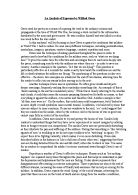Futility
The poem Futility is based in World War 1. The first stanza it is about a soldier who has just passed away, and how now nothing can wake him, not even the sunlight which supposedly is meant to give life. The second stanza then talks about the sunlight, the earth and life, and how it is unfair and pointless if all this beauty is created, to just be destroyed by war and death. This poem is told by another soldier, who witnesses the whole event, and then whom speaks his views about it and other subjects. The title is ‘Futility’ which means something is pointless, this is so called because he talks about how war and all the effort is meaningless as because the outcomes are always terrible.

This is a preview of the whole essay
Peer Reviews
Here's what a star student thought of this essay
Quality of writing
The Quality of Written Communication here is fine. There are no glaring errors in the candidate's use of grammar, spelling and/or punctuation. The candidate clearly tasks care with their QWC marks. Though there are not many marks available as this is only a small part of the mark scheme, it is still imperative candidates ensure clarity in their written expression, because if they don't they can ultimately be penalised, this being a subject where QWC is regarded very highly. This candidate has clearly spell-checked and re-read their work to ensure they have made no silly errors that can slip by unnoticed even when we don't realise we've made them.
Level of analysis
The Level of Analysis here is fair, but by no means exhaustive. Where the candidate appears to make some points well they actually state a very obvious fact about the poem and comment only in-part of the poetic resonance of such points, e.g. the sonnet structure of the poem is noted, but the candidate instead chooses to comment on the break and way the mood and language style changes in both. Where they could improve on this point is that they could concern themselves with how the use of a sonnet structure gives the poem the intense emotion of sorrow. Sonnets are conventionally seven pairs of fourteen unbroken lines in a rhyming couplet rhyme scheme, with decasyllabic, iambic pentameter rhythms to each line. How does the use of an unconventional rhyme scheme (if any rhyme scheme at all) and the break in the middle of the poem show Owen's rebellion against the conventional? Is he a conventional soldier? How is this reflected in 'Futility'? This is the level of structural analysis that should be implemented to really improve the candidate's grade. The candidate should look to concern themselves with more than just one piece of commentary to each point they make - coming to just one conclusion from such complex poetry is by no means detrimental to the essay, but it does limit the insightful analysis that the candidate could write - write a lot about a little, rather than spread your skills broadly and write an answer that lacks depth.
Response to question
The candidate here is analysing Wilfred Owen's 'Futility'. They make a fair analysis concerning the tone of the poem and also the structure and imagery Owen uses. The essay presented here should expect to achieve a low/middle C grade for GCSE. Where it could improve is the language analysis - though one point is made, it lacks the depth that would satisfy the mark scheme. This is consistent throughout - good analytical points are started but are left unfinished and/or are not commented upon to a length appropriate to achieve a B grade. As well as this, the candidate's structure needs work - the easiest way to analyse a poem within the time limit is to dedicate a paragraph to language, one to structure and one to imagery. If the candidate really wants to impress, they can add a contextual paragraph, but only if necessary - this would require external research and is really worth the effort as it can liven up any essay for an examiner who has to mark many of the same essays.








